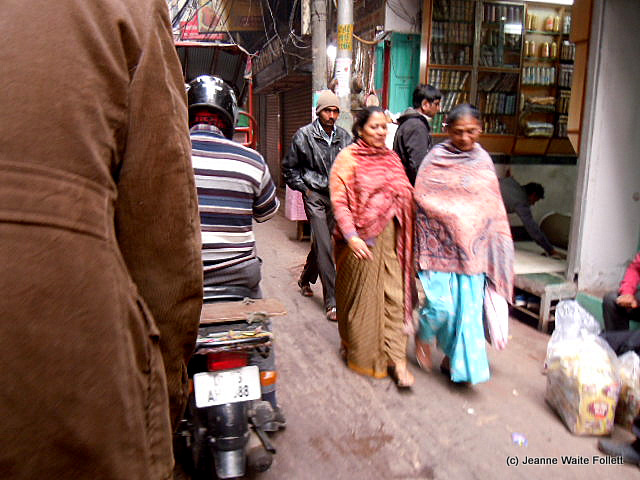No people whose word for 'yesterday' is the same as their word for 'tomorrow' can be said to have a firm grip on the time.― Salman Rushdie, Midnight's Children
Schedules dare to be broken. The human impudence that creates a schedule in the first place births the folly that will will smash a schedule into smithereens, throwing numbers separated by colons and carefully crafted timelines to all points of the compass, all the while giving guides and restaurant owners and rickshaw drivers ulcers.
It's at times like those that Serendipity sneaks in and livens up the day. To wit, take our morning in Old Delhi:
We play our part, we tourists who regard our guide's instructions as carved in the red sandstone from which the Jama Masjif Mosque is constructed. When our allotted time in the mosque has expired, we turn in our "fashionable" robes and once again become the dreaded "semi-naked foreigners." Outside the main gate, we rummage around until we find our shoes, put them on, and descend the stone steps.
 |
| Fashionable, no longer semi-naked foreigners. |
Our coach is parked there, just to the side of the street, and guide Dineesh waits for us to assemble. Lean and wiry men push their bicycle rickshaws into the crowd and Dineesh supervises the hap-hazard loading of American tourists into the narrow seats of the carts.
And then, we're off. The bicycles are primitive. There are no ten speeds or twenty speeds, no fat tires for ease of ride, no soft fancy seats for the struggling Indian peddling the contraption through bumpy lanes and congested traffic.
Hanging on is a necessity. Taking photos in focus is just plain luck. Taking a video while trying not to drop the camera or fall out of the rickshaw is a miracle. Hence, two short videos of the beginning of the ride follow. I keep accidentally pressing the off button, so I opt to try still shots.
We turn off this main street into the 17th century lanes and passageways, so crowded with shoppers and vendors that progress is often halted, making it even more difficult for the pedicab peddler who has then lost momentum.
When the buildings were erected in the 1600s, there was no internal wiring for electricity, obviously, so when electricity came to Old Delhi, the wires were strung on the outsides of buildings. Over the years, as more and more buildings and rooms were wired, a splendiferous tangle of wires accumulated over the narrow lanes, threatening to block out the light in places.
To make a dangerous situation even more dangerous, monkeys like to crouch amongst the wires, and, as you can see, play with them.
On we go through these fascinating alleyways, bumping and bouncing and soaking in all the sights and smells.
As we pass the grape vendor above, we make a left turn onto a brighter, smoother street, but one just as busy with commerce of the day.
 | |
| Lots of book stores. |
 |
| Stringing marigold blossoms. |
 |
| Shoeshine. |
I take a photo of my "driver," tip him, and board the coach. So far, so good.
Eventually we are all present and accounted for on the coach. Right then is when the folly of keeping to a schedule, birthed by the human impudence of creating one in the first place, is lost. For us tourists, it is Serendipity calling with a Jain parade, a long, loud, interminable celebration that locks our coach in tight to the curb. Lunch will have to wait until the parade is over.
Unlike the naked Jain saint-to-be we had seen earlier, there are no naked men in this parade, but a fantastic array of uniforms, marching bands, dancers, and on-lookers delighted with the whole scene.
Dineesh looks at his watch and pales. There is nothing he can do. Here are photos of only a bit of the parade, taken through the window of the coach. It must have lasted a half hour.
This group of children had been begging at the side of the coach before the parade began.
 | ||
| Soon, the cheeky little guys are dancing right in the middle of the music makers. |
Finally. The coach pulls away from the curb and heads out of Old Delhi, bound for Broadway.
Yes, Broadway. The name of the restaurant where we are to have lunch.
 |
| Poster for Bollywood. |
 |
| Propane bottles. |
This is our last outing. Tonight we will gather in the hotel dining room for a farewell dinner. Tomorrow evening, the coach will take us to the airport. That means we have all of this afternoon and all of tomorrow until evening to ourselves. Ususally, this free time is afforded to tourists to go to sites or restaurants on our own.
Further, our guide Dineesh will not be available tomorrow as he will go to the airport earlier to meet a new group of tourists. Avril, who has been guiding the other half--the orange half-- of our total group will be available to us at the airport.
Dineesh advises us not to go out of the hotel tomorrow. There is nothing to see in that neighborhood and it might be dangerous on our own, he explains This is the most peculiar ending to a group tour I have ever experienced.
For myself, I am glad for the opportunity to rest my aching body and pack by bag at leisure, but I am not sure how I feel about a guide leaving us early and an entire day without an activity.
The India Journals will conclude with two more chapters. In the next, I will tell you about an iconic place in India, a most fitting end to the journey in and of India.
































































